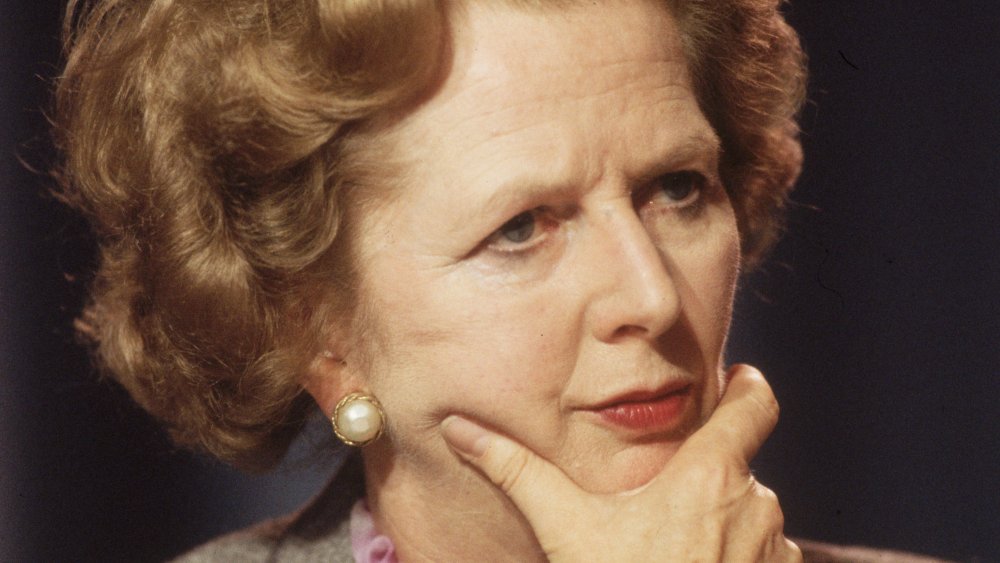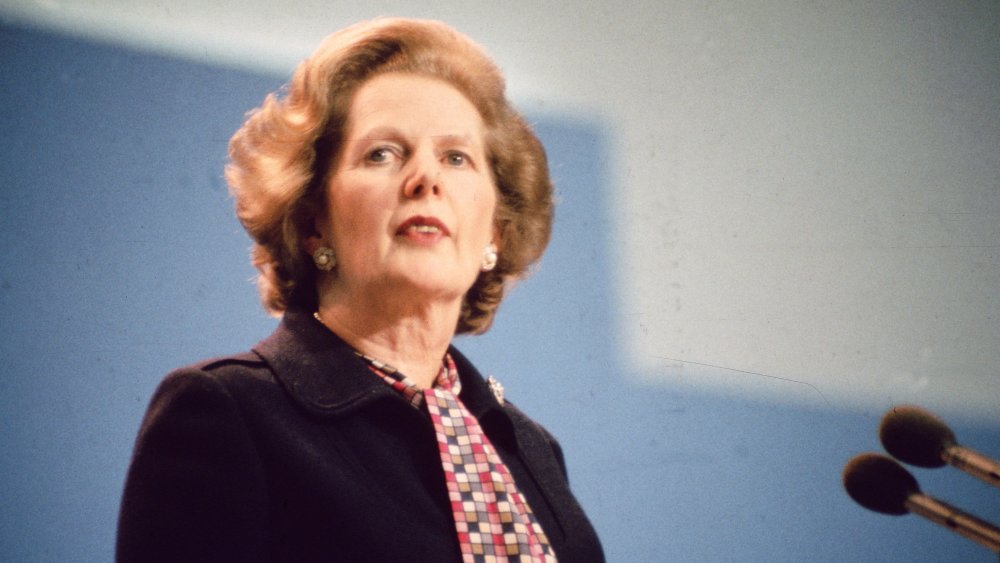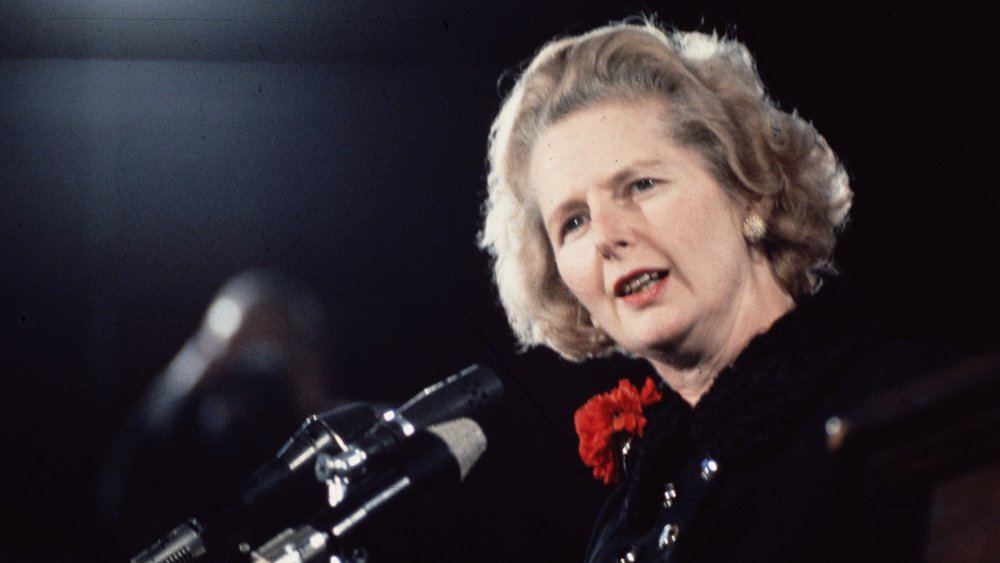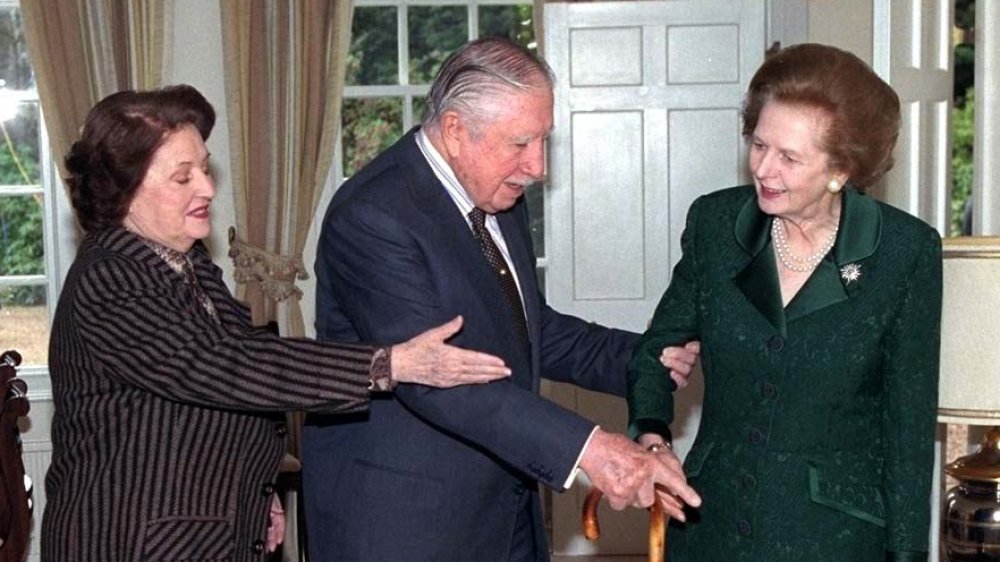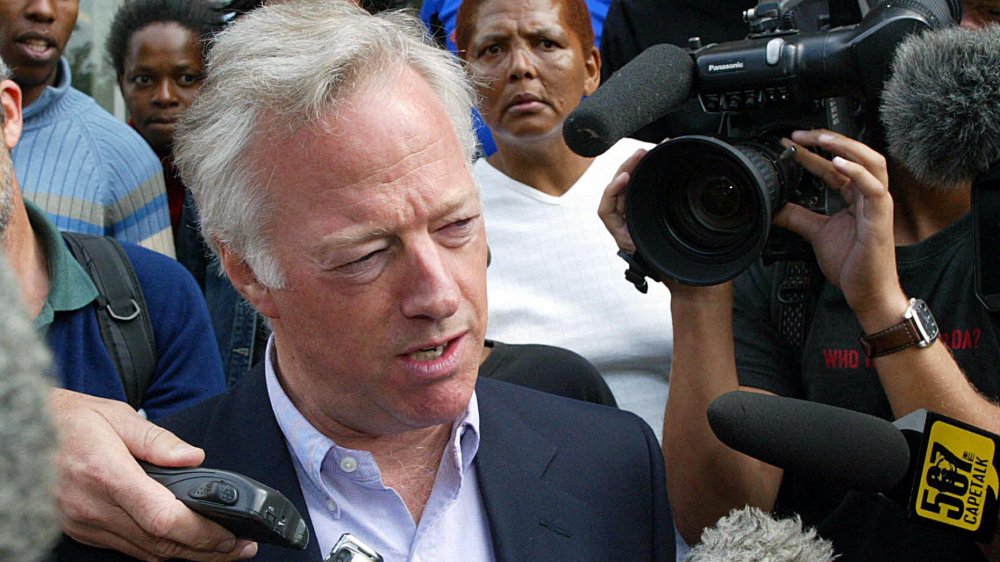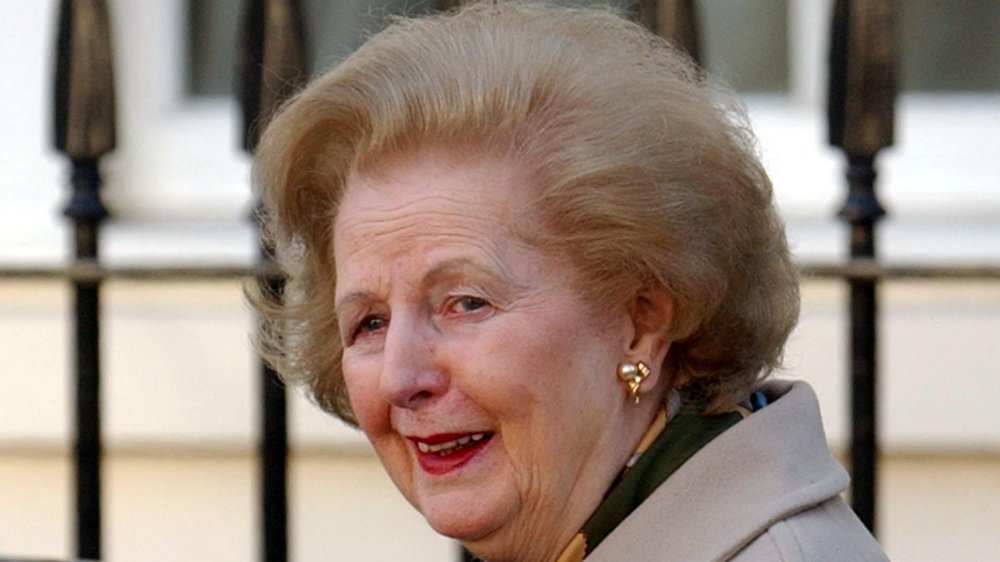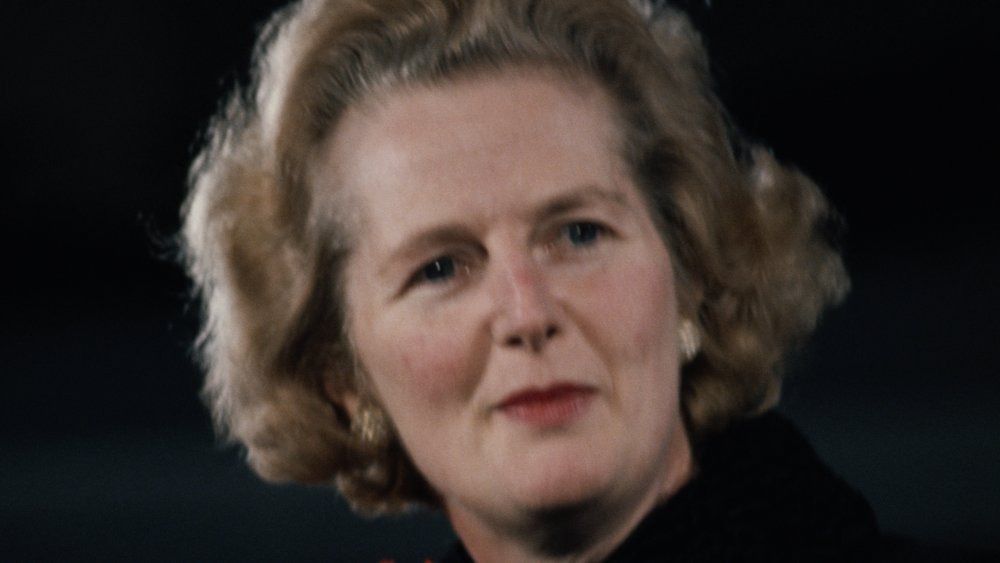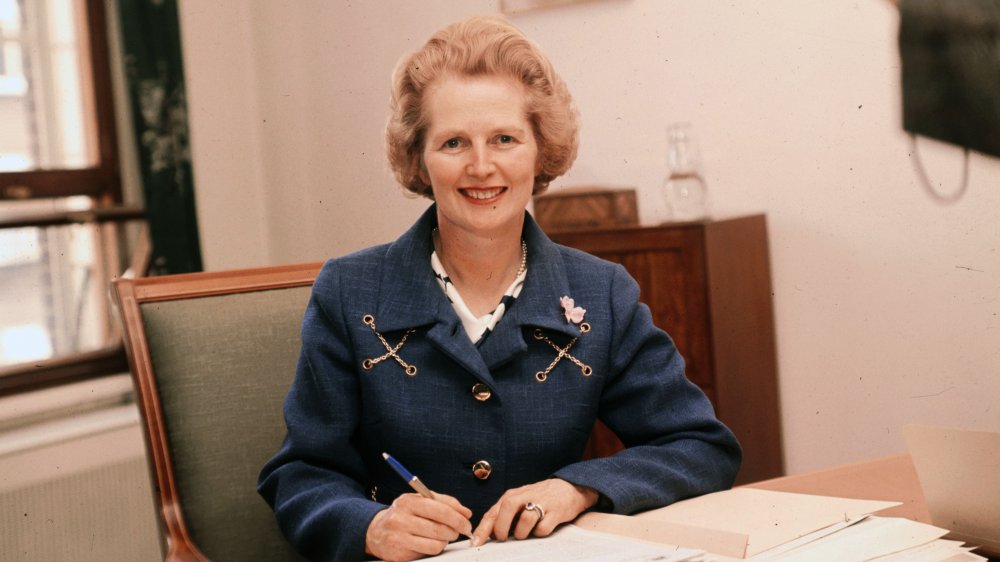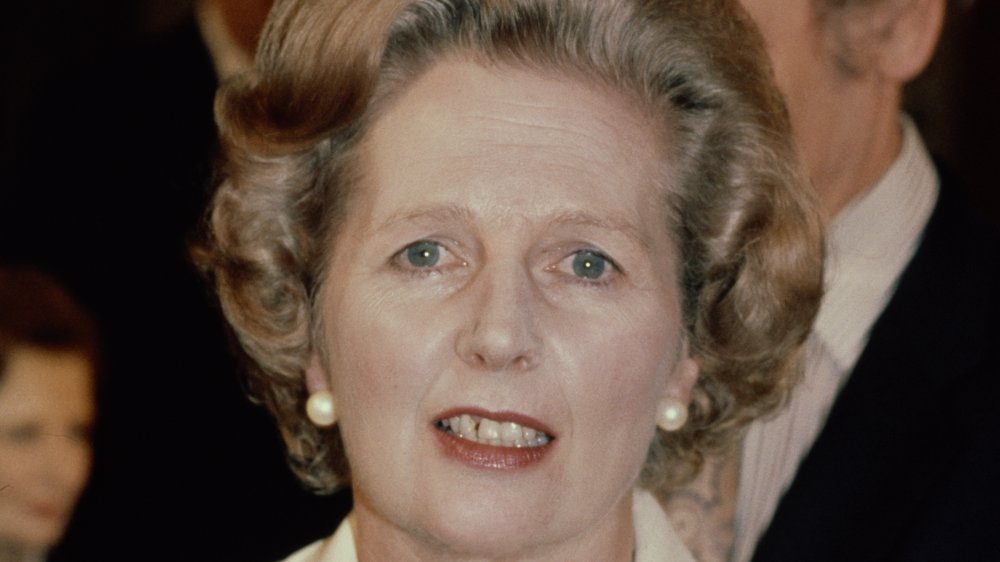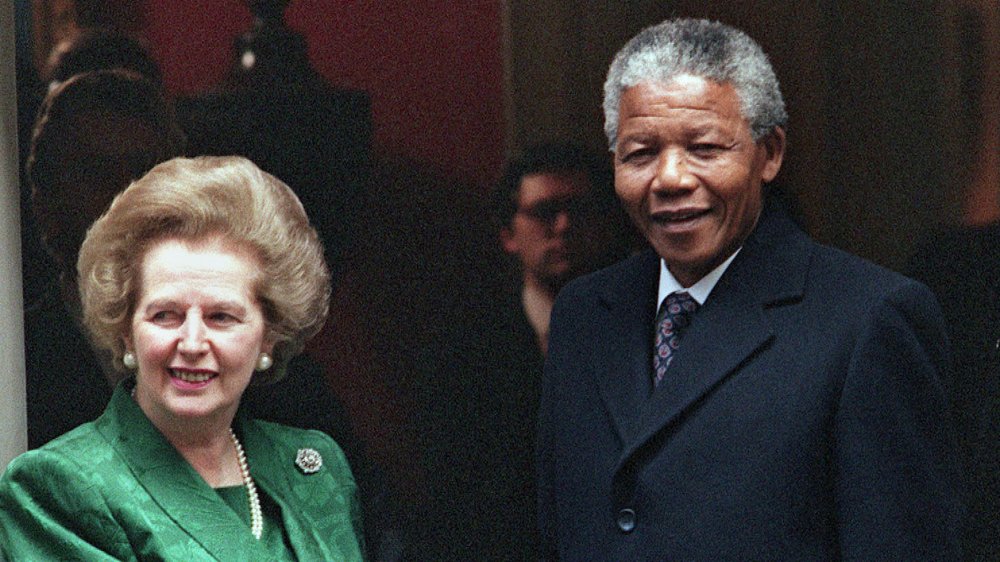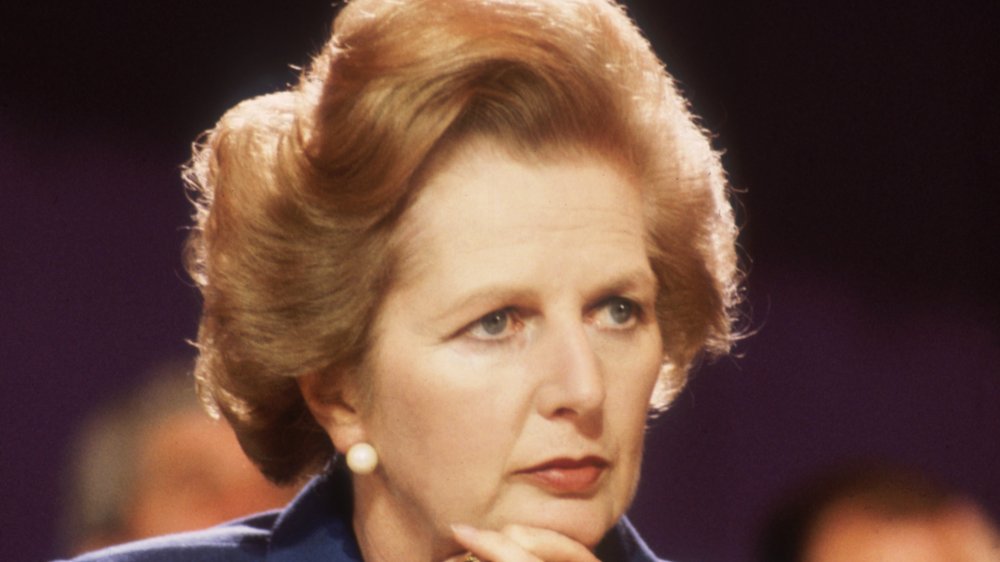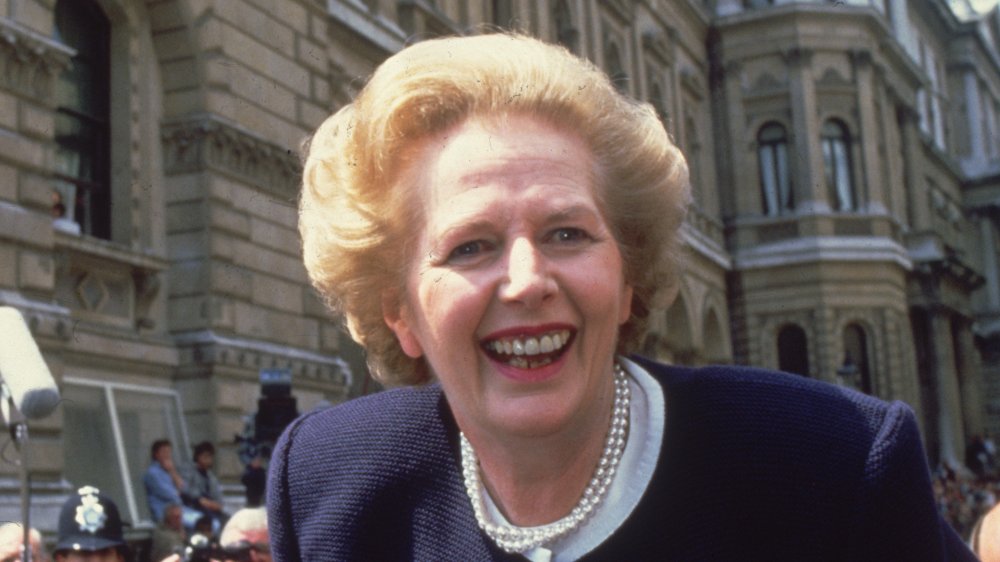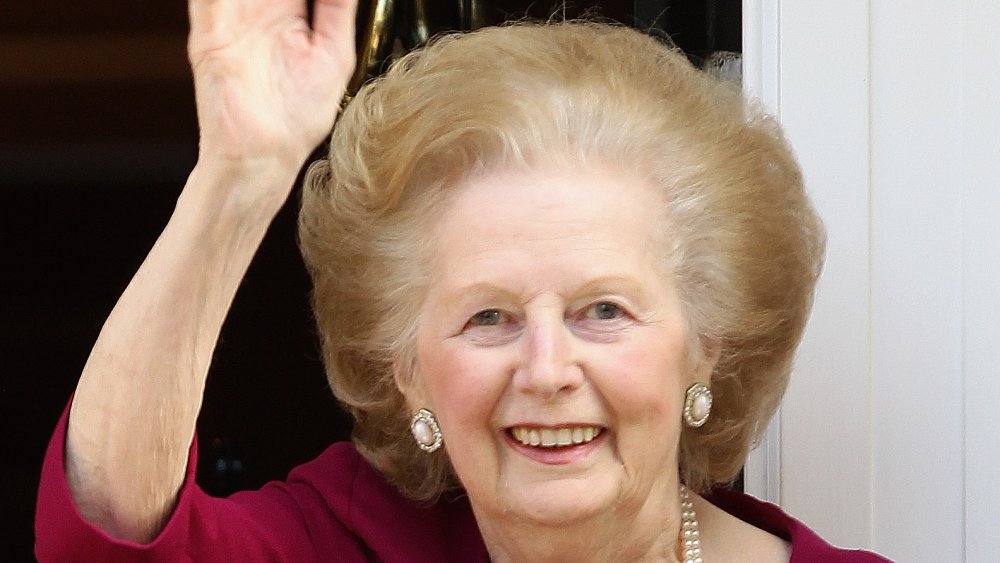The Messed Up Truth About Margaret Thatcher
She's one of the greatest world leaders of all time. Margaret Thatcher was the Iron Lady who ran Britain from 1979 to 1990, a period in which she defined a generation. On the world stage, she was renowned for her close friendship with Ronald Reagan, and for standing up to the Soviet Union. At home, she was the free market conservative who liberated Britain from a decade of economic stagnation, even as she smashed glass ceilings that had once been marked "no woman shall rise beyond this point." One of the few British leaders just about everyone on Earth can name, she's often voted the greatest PM of all time, beating out even Winston Churchill (via YouGov).
But this isn't the whole story. You know how in The Wizard of Oz, the wizard looks all great and powerful from afar, only to be revealed as a weak nobody on closer inspection? You can do something similar with Margaret Thatcher's legacy. From the vantage point of the 21st century it can appear all shiny and radiant, but examine it closer and it starts to seem like the only thing behind the curtain is a litany of disastrous choices. Here are the most disastrous of all.
Margaret Thatcher, milk snatcher
In the aftermath of WWII, the Labour government had a minor crisis on its hands. Huge swathes of the British population were growing up undernourished, a fact that ongoing rationing really wasn't helping. So they came up with a simple solution: From then on, every school age child would receive a free glass of milk every weekday. It was a cheap, popular policy. So popular, in fact, that when Margaret Thatcher canceled it in 1971, it caused an outcry.
The Independent has the story. 1971 was the year of Ted Heath's Conservative government, which was trying to make huge savings to the budget. At the time, Thatcher was the education secretary — her first major political role. Trying to trim back spending in her department, she ended the milk subsidies for all children over the age of seven. It made minor savings at best and was, as the Labour education spokesman said, "the meanest and most unworthy thing" the country had seen in decades (via The Telegraph).
Ending the subsidy was so unpopular that people would shout "Thatcher, milk snatcher!" when they saw her in the streets. Along with other cuts to the education budget, it so angered the sector that Oxford University refused to give the then-PM an honorary degree in 1985.
Margaret Thatcher's Poll Tax triggered the worst riots in a century
Even today, mentioning the dreaded "poll tax" can send a shiver down Conservative MPs' spines. A 1989 change to local council tax rates, it swapped taxation on a property's rental value for taxation on the number of adults living there. But, as ThoughtCo explains, the details don't really matter. What matters is that the tax generally drove down taxes for the rich, while hiking them up for everyone else. As George H.W. Bush could tell you, new taxes are a pretty guaranteed way to get your voters to turn on you. In Thatcher's case, they didn't just turn on her. They rioted.
There were ominous rumblings even in the planning stages. Cabinet memos exist from the year before the tax was rolled out, advising that resistance was growing (via BBC). Yet Thatcher not only plowed on, she publicly owned the policy. She forced it onto Scotland first, in 1989, triggering mass civil disobedience. But rather than be deterred, she then imposed the new tax on England and Wales the following year. The results spoke for themselves.
In London, a mass protest devolved into the largest riot the capital had seen in 100 years. Across the country, people refused to pay. The tax was so destabilizing that Thatcher was begged to withdraw it. But she was too stubborn, so her party instead deposed her in a leadership contest, ending her premiership. The hated tax wasn't ended until John Major became PM in 1991.
Margaret Thatcher vocally supported Chilean dictator Augusto Pinochet
There are some sentences so auto-satirical that it's impossible to parody them. Margaret Thatcher's comment to Augusto Pinochet (above) in 1998 is one such example. Before news cameras, the by then retired PM firmly told the ex-Chilean dictator, "It was you who brought democracy to Chile." That's a definition of the word "democracy" that apparently involves overthrowing the elected government in a coup, ruling as a military strongman for 18 years, and murdering over 3,000 dissidents while torturing 40,000 more (via BBC).
But then everything about Thatcher's relationship with Pinochet was absurd. As the New Yorker details, Britain had previously suspended arms sales to Chile following the 1973 coup, which saw thousands arrested and herded into makeshift torture centers. The moment Thatcher came to power, she restarted the arms sales, apparently more impressed with Pinochet's anti-Communist credentials than his wanton murder of civilians. When the ex-dictator was held in London on an international arrest warrant in 1998, she not only made speeches in support of freeing him, she also visited him to share glasses of scotch.
The official line from Thatcher supporters is that she was grateful for Chile's clandestine help during the Falklands War. But since that war took place years after arms sales were restarted, it seems more likely that Thatcher just... err, liked hanging out with a bloodstained tyrant?
Mummy's favorite
We all know the stereotype of the doting mother who refuses to see how awful their child is. Well, Thatcher embodied that stereotype to a T (or should that be tea, since we're talking about Britain?) Mark Thatcher is a man once described by the London Review of Books as "without talent but filled with self-belief and utterly brazen," a guy who "traded endlessly and ruthlessly on [his mother's] name." He's the planet's prime example of an upper class twit, and yet Thatcher not only refused to believe he could do no wrong, she actively helped him do some very wrong stuff.
Take the al-Yamamah arms deal. In the 1980s, Mark traveled to Saudi Arabia to secure an arms contract for his mom's government. Fair enough, but what is less fair is that he used his position to reportedly net himself a cool $12 million from the deal. Or how about Mark's construction deal with Oman, in which Thatcher is said to have pressured the Sultan of Oman to award a lucrative contract to her son's business, according to the Independent.
The repeated pattern is of Mark acting like a corrupt hog while Thatcher facilitated everything, often bailing him out of trouble by paying outrageous sums, such as when he was arrested for illegal arms dealing in South Africa (pictured outside his trial). While all this was happening, she treated her daughter Carol with a coldness so hostile Carol later said she effectively grew up without a mother (via the Guardian).
Margaret Thatcher allegedly supported a coup attempt in Equatorial Guinea
Speaking of Mark Thatcher, has anyone heard of the Wonga Coup? In 2004, a group of South African mercenaries tried to overthrow the dictator of Equatorial Guinea, a venture that ended up with most of them languishing in awful jails. But not all of them! In 2005, Mark Thatcher pleaded guilty in a plea bargain with the South African courts, admitting he had a role in the coup attempt (via the Guardian). But the buck may not have stopped with Mark. According to the leader of the coup attempt — Simon Mann — Mark first sought mummy's approval before going ahead.
The explosive claims were reprinted in the Guardian. According to Mann, he was introduced to Mrs. Thatcher by Mark, and made aware that the ex-PM had full knowledge of their planned coup. He writes that Thatcher told him in 2003, in reference to their plans, "I do hope you'll be getting on with this job of yours soon, Simon. We mustn't let anyone down, must we?" Supposedly she later advised Mann to become involved in another plan to launch a coup in Venezuela, because why stop with overthrowing one dictator when you can bag two?
It's worth noting that these allegations haven't been substantiated. But, still, if there's even a grain of truth to them then it shows that Thatcher got up to some truly terrifying stuff in her retirement.
"Feminism is poison."
Thatcher famously once remarked "I hate feminism. It is poison," (via the Irish Times.) And, boy, does that quote ever sum up her attitude towards other women. Although Britain's first female PM is regarded as a trailblazer and, for that reason, considered a feminist hero in some quarters, the reality is that Thatcher didn't just pull the ladder up after her, but chopped it up with an ax, set fire to it, and then used the flaming wreckage to firebomb all those trying to follow in her footsteps.
As the Guardian details, Thatcher had an almost pathological aversion to promoting other women into positions of power. Never mind that she'd been given the opportunity to prove herself in Ted Heath's government. During her 11 years as premier, Thatcher promoted only a single woman into the cabinet. Conservative politician Edwina Currie once remarked she "would see (male) MPs who came into any politics after I had and who were no better than me being promoted over my head."
Thatcher's anti-feminist legacy was on display outside Number 10, too. She claimed the battle for women's rights had been "largely won," and then spearheaded policies which disproportionately affected millions of working mothers across Britain. It's one thing to smash the glass ceiling. It's another entirely to then replace it with reinforced steel.
Margaret Thatcher supported the homophobic Section 28
One of the most darkly amusing things about watching an insecure majority at work is the way its members go out of their way to act like they're the ones being oppressed. (See: anyone who has ever used the term "white genocide.") So it was with Thatcher's Conservative government and Section 28. In 1983, a British publisher put out the first English language edition of the Danish children's book Jenny Lives with Eric and Martin, which posited the incredible notion that gay men could not just live together but actually be happy. Such a clearly horrific thought sparked a moral panic that culminated in 1988 with Section 28.
As the BBC explains, Section 28 prohibited "the promotion of homosexuality by local authorities." Suddenly, any teacher who spoke about LGBT people in a non-negative light could lose their jobs. Per Thatcher: "Children who need to be taught to respect traditional moral values are being taught that they have an inalienable right to be gay. All of those children are being cheated of a sound start in life." Because it's not like that statement could unleash a wave of homophobic bullying against LGBT children, right?
Predictably, that's exactly what happened. Kids who grew up LGBT in the UK between 1988 and 2003, when the Labour government scrapped the law, were vulnerable to homophobic abuse and zero help from authority figures. In the end Thatcher's policy cheated far more children of a sound start than any number of harmless books could've ever hoped to.
Margaret Thatcher supported the Khmer Rouge's right to rule Cambodia
The Khmer Rouge are the genocidal maniacs all other genocidal maniacs have nightmares about. Under leader Pol Pot, they instituted Year Zero in Cambodia, a series of mass killings that wiped out around 2.2 million people (via History), nearly a quarter of the entire population. The only reason the genocide stopped was because Communist Vietnam invaded and occupied the country, removing Pol Pot from power.
Whatever you think of Communist Vietnam, the Khmer Rouge were clearly the bad guys here. But not for those who'd grown up with a Cold War mentality. After Pol Pot's fall, Cambodia's UN seat was meant to go to the new government. But Thatcher, along with the US and China, insisted on keeping the seat for the Khmer Rouge (via the New Statesman). Not only that, but London provided military training to the remnants of the Khmer Rouge still fighting an insurgency in Cambodia's jungles.
The equation seems to have been "Communists = bad. Genocidal maniacs who are also Communists, but nonetheless fighting those first Communists = obviously the good guys!" Remarkably, this policy of helping Pol Pot's goons outlasted even Thatcher. It wasn't ended until the Major government in 1992.
Margaret Thatcher had a hugely complicated history with apartheid
During the years of white supremacist rule and the system of apartheid, South Africa was a pariah on the international stage. This included in London, where Thatcher was famously appalled by Pretoria's racist policies and destabilization of other African nations. But even though Thatcher was an anti-racist who pressured South African leader P.W. Botha to change his regime (via the Telegraph), she also made some very controversial decisions and comments on apartheid that haunt her legacy to this day.
The headline comment, according to Time, is the one where she accused Nelson Mandela's ANC of being "terrorists." But it was her actions that were much more troubling. At a time when South Africa was being isolated globally, Thatcher refused to implement sanctions against the regime. Her allies say this was so Britain would continue to have leverage over Botha. Her critics, such as the Guardian, note that Thatcher's husband Denis had business interests in the country that would've been damaged by sanctions.
It's likely no coincidence that the early 1980s were the time when members of official Federation of Conservative Students were pictured wearing stickers that read "hang Mandela." When David Cameron became Conservative leader in 2006, he apologized for the way his party had treated the issue of apartheid under Thatcher, no matter what the Iron Lady's personal convictions had been.
Margaret Thatcher's treatment of hunger strikers made the Troubles worse
In the 1980s, Northern Ireland was in the grip of something known as the Troubles, a 30-year guerrilla war between (mostly) Protestants loyalists and (mostly) Catholic republicans that killed around 4,000 people. While those living in other nations tended to see the conflict as a political war, Thatcher's government refused to classify captured IRA members as anything but common criminals. This seemingly minor distinction came to an ugly head in 1981. That year, IRA members interned in the Maze prison began a hunger strike after having their special status revoked. Thatcher refused to listen. The fallout from that refusal would last years.
The BBC has the story. Thanks to the quirks of UK politics, one of the hunger strikers, Bobby Sands, was elected MP for Fermanagh and South Tyrone while starving himself. This put the Thatcher government in the position of allowing a member of Parliament to die in a UK prison. There was a huge push to recognize Sands' political status, but Thatcher refused and, on May 7, Sands died in prison.
The deaths of the hunger strikers had a galvanizing effect across Ireland. The Troubles immediately intensified. While it's not hard to see Thatcher's point of view, her inflexibility likely killed any chance at negotiating an end to the Troubles for years to come.
Margaret Thatcher's government oversaw a blood scandal that killed thousands
In the 1970s, the UK was suffering from a shortage of blood for transfusions. So the government began buying it in from abroad, notably from America. Unfortunately, they opted for the cheapest stuff, from Arkansas prisons and high-risk people. As a result, Britain was slowly deluged with blood contaminated by both hepatitis and HIV. Although Thatcher's government wasn't in power when the blood was first bought, they were in power when the first alarming evidence emerged that this imported blood was killing thousands of vulnerable Britons. So what did they do? Why, refused to believe the evidence and then covered it up, of course (via the Guardian).
The contaminated blood scandal went all the way from up from individual doctors to those in the highest levels of power. Some doctors gave potentially infected blood to patients without telling them of the risks, while Thatcher's cabinet scrambled to limit any compensation the government might be forced to pay out (via Sky News).
Ultimately, the contaminated blood scandal infected over 4,000 Brits, and killed 2,600 — a death toll nearly on a par with 9/11. While the blame lies mostly with Thatcher's health secretary, it's clear most of the cabinet knew about the problem ... and did nothing.
Margaret Thatcher's last years were marred by dementia
Whatever you think of her years in office, there's no denying that Margaret Thatcher's end was messed up in all sorts of ways. Famous in Whitehall for her ability to memorize nearly any detail during her years in office, Thatcher was transformed within a decade of retirement into someone who could barely keep a grasp on day-to-day activities. Ravaged with dementia, she slipped into a sad twilight world. It must have been painful to witness.
The closest account we have comes from her daughter, Carol (reported here via the Sydney Morning Herald). According to Carol, Thatcher began to exhibit signs of dementia as early as 2000. However, she went on to live another 13 years, during which time the symptoms only got worse.
The hardest aspect for Carol was apparently the way Thatcher kept forgetting that her husband had died in 2003. She recalled having to repeatedly break the news to her mother, which must've been agonizing. But still the dementia worsened, until, by the end, Thatcher was unable to even finish single sentences without forgetting what she'd been talking about. No matter what your politics, you'll likely agree that this was a dreadful finale to her life.
